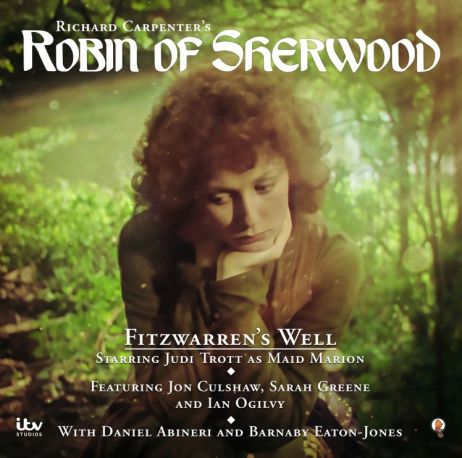With Robin of Sherwood having just celebrated its 40th birthday, it’s the ideal time to dip back into the series’ back-history with this latest audio release from AUK Studios/Chinbeard Books – Tales Untold by Jennifer Ash.
But for once, the focus isn’t on Robin and the Merries – instead, this audio comprises 5 vignettes (each around 15 minutes each) which shine a light on some of the series’ ancillary characters. Some are friends and some are foes and this release gives them all the chance for their characters to be developed and deepened.
Reprising their roles from the television series are Robert Daws (Hubert de Giscard), Oliver Tobias (Bertrand de Nivelle), Daniel Peacock (Sergeant Sparrow) and Claire Parker (Elana Scathlock). Terry Molloy takes over the role of the Old Prisoner from Stuart Linden.
Also appearing are Conrad Westmaas, Philip Pope and Barnaby Eaton-Jones, all of whom add considerable extra value – they’re not simply there as line feeds for the main characters.
Up first is The Giscard Dilemma. Fleeing Nottingham after the events chronicled in The Sherriff of Nottingham (3.5), a desperate Giscard holes up in an isolated tavern where he pours out his story in an incoherent fashion to a patient landlord (Eaton-Jones). It’s a nice, compact two-hander with Daws (like his fellow stars) effortlessly slipping back into his character after a gap of nearly four decades.
The Old Prisoner’s Friend is the tale with the greatest emotional pull. On screen, the old prisoner existed to provide a moment of comic relief – incarcerated in the dungeon for years (possibly because he’s been forgotten about) he, and his rodent friend Arthur, would greet each new arrival with the exhortation that “feet first” was the only way to get out of this dark hole.
In The Old Prisoner’s Friend, he meets Arthur for the first time (spoiler alert – there’s more than one Arthur) and proceeds to recount his life-story to his rodent chum. At least, as much of his story as his fractured mind can recall. It’s a bleak little yarn, teasing us for a while that we might finally learn exactly why he’s been imprisoned for so long. Terry Molloy offers a fine monologue that lingers long in the memory.
Bertrand’s Confession finds a dying Bertrand de Nivelle confessing all to a priest (Westmaas). Tobias had appeared in Lord of the Trees (2.3) – invited to Nottingham by his friend the Sheriff to deal with Robin Hood. Oliver Tobias deftly captures the dichotomy of a character like de Nivelle – he might have been an unthinking murderer at times, but he also possessed his own moral code (and his failings have come back to haunt him as he nears death).
After a couple of rather downbeat tales, the time’s right for an abrupt change of pace. And that’s offered with Sparrow’s Choice. This is great fun, featuring a rollicking turn by Daniel Peacock as the forever put-upon Sergeant Sparrow (Philip Pope and Barnaby Eaton-Jones are excellent as well – making this a fine three-hander). Lovely stuff and I could easily have listened to much more of the misadventures of Sparrow.
The CD concludes with Elena’s Love, which features Claire Parker as Elena and Terry Molloy as her stepfather. Besotted with Will Scathlock, Elena is determined to marry him (despite her stepfather’s disapproval). Eventually he realises that his strong-willed daughter must have her way – and Elena and Will look set for a lifetime of bliss. Of course, we know only too well how how this story will play out and what the consequences are for Will ….
It’s nice to hear Clare Parker again (who after nearly forty years still has no problem in sounding like a headstrong young woman). Her list of television credits isn’t that great, but she appeared in a number of 1980’s series (Pulaski, Knights of God, Hannay) that remain close to my heart. She made her debut in the 1981 adaptation of Vice Versa (a series that I hope will escape into the wild one day).
With Alexander White providing very Clannad-like music, Tales Untold is a strong anthology which I’m sure will reward repeated re-listens.
At the time of writing, the CD is available via this link together with a copy of the novelisation (which includes an extra story not featured in the audiobook). When the physical stock has sold out, the audio will only be available as a download and the ebook won’t feature the extra tale. So for those who like to have a product to hold, it’s worth ordering now.



















